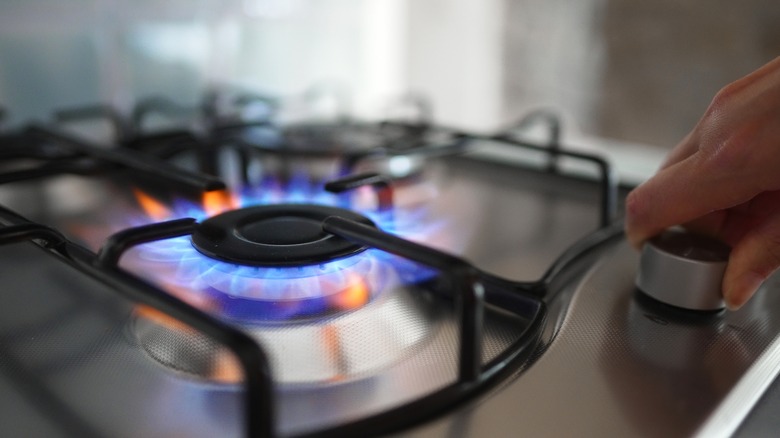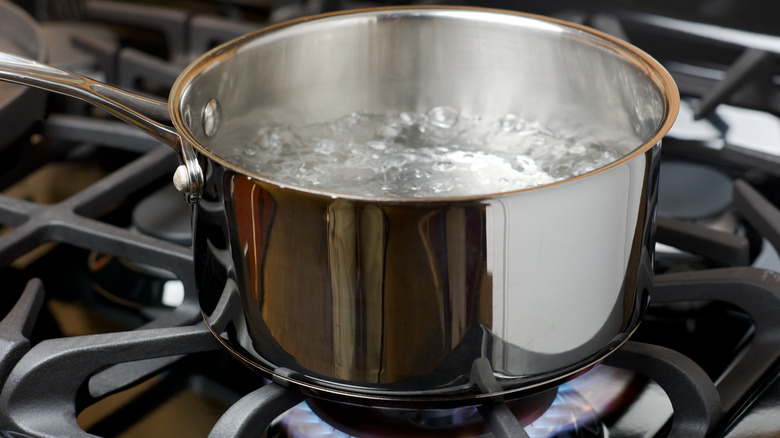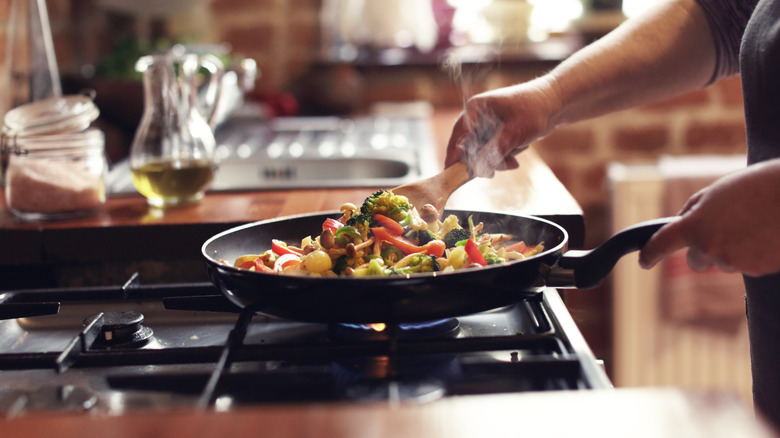The Burner Mistake Everyone Makes With Gas Stovetops
Have you ever wondered why the burners on your stove are different sizes? If you're like many, probably not — but it's important to understand the differences in size to avoid making costly and potentially dangerous burner mistakes. You should avoid using a pot that's the wrong size for your stove's burner. Don't use a small pot on the big eye, and don't use a large skillet on the small eye.
As Chef Shelley Blechar, owner of Elegant Eats, a personal chef service in Dallas, explained to Business Insider, "It's a common mistake for people to misuse the different size burners on a gas stove. The different sizes are used for different-sized pans." Each of the stove's burners has different uses. For instance, the large burner is used to heat things quickly. It's great for when you're doing something fast, like boiling water or pan-searing a steak. Larger burners conduct a lot of heat for this purpose. Meanwhile, small burners are used for simmering food. In fact, they are sometimes called simmer burners. You would use these burners to slow-cook something over several hours. Some stoves also have a medium-sized burner, which can be used to simmer or quickly cook food. They're more of an all-purpose eye.
You should use appropriately sized pans for each (small pots for small burners, large pots for large burners). Doing so will save you money on your gas bill every year, but it will also help you avoid these pitfalls.
What happens if you use the wrong burner?
Using the wrong pot for your burner can have a detrimental effect on your food. If you're using a pan that's too small for the burner, it's easy to quickly scorch your food due to the excess heat. On the other hand, if you're using a large pan on a small burner, then your food will take longer to cook. Either way, you run the risk of using more energy and gas and also wasting time as a result.
However, it's not just as simple as using the smallest pot you have for the smallest burner and calling it a day. You should also consider what you're planning to cook, and use the right pot accordingly. For instance, if you're planning to sear a smaller cut of steak, you would be better off using a smaller skillet on the small eye than dumping it into a large pot on the large eye. This is because the flames from the larger burner are directed outward, meaning it may not cook the piece of meat in the center of the skillet as quickly as it would on a smaller burner. Likewise, cooking something smaller in a large pan may lead to a more uneven cooking. On the other hand, if you're planning to boil water or another liquid, it's always better to boil in a large pot on a large burner, because it boils more quickly. This is due to how the liquid is distributed in the pan.
Use a small burner over a large one in a pinch
Okay, so what should you do if you don't have a pan that fits the size of your burner? Is it better to use a small pot on a large eye or to use a large pot on a small eye? As a general rule of advice, you should avoid using a small pot on a large eye at all costs. Not only will it scorch your food as mentioned above, but it can also lead to you potentially getting burned. If you're using a small pot, the heat and flames from the burner can go up the sides of the pot. This could potentially scorch your fingertips if you have your hands in the way, and no one wants to wind up in the ER at dinner time.
Likewise, the flames from the burner can potentially melt the handle of your pot as well. Some home cooks shared their own horror stories and concerns on Reddit. One wrote, "You also run the risk of melting or burning any plastic or wood handles." Another commented, "Using a small pot and large burner risks heating your handles (assuming plastic) where they break down really quickly." Likewise, you also run the risk of wasting more energy. The American Council for an Energy-Efficient Economy found that using a small pot on a large burner wastes 40% of the heat created. So next time you're trying to figure out which burner to scramble your eggs on, keep that in mind.


